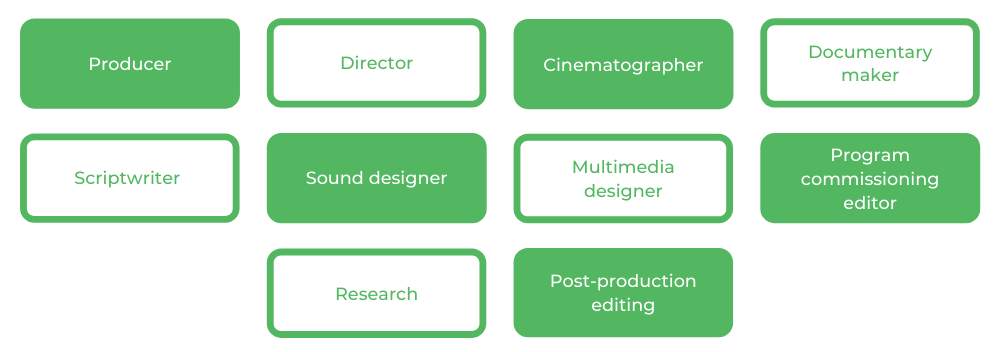So, you’ve seen the facts about what it’s like to study Media Arts and Production at UTS and now you’re in desperate need of a student’s real opinion of the course?
We thought so. You’ve come to the right place!
We’ve had a chat with Anna, a real student with real opinions in the Media Arts and Production course at UTS. We’ve asked her about the pros and cons, the ups and downs and what it’s really like to study Media Arts and Production.
Let’s get started!
Why should you study a Media Arts and Production degree at UTS?
Top 3 Pros of a Media Arts and Production Degree
Top 3 Cons of a Media Arts and Production Degree
Mistakes You Shouldn’t Make
Things to Know Before Starting UTS Media Arts and Production
What Makes this Degree Different
Motivations for Studying UTS Media Arts and Production
Potential Career Paths
Why should you study a Media Arts and Production degree at UTS?
A Bachelor of Communications is an undergraduate degree that involves the broad study of the humanities and social sciences. Because the Communications part is generally quite extensive, UTS gives its students the chance to make the degree a little more specialised by majoring in a particular discipline.
Once you’ve completed your first year at UTS, you have the opportunity to study a second major alongside your original choice. As a Communications student at UTS, you could major in:
-
- Media Arts and Production
- Digital and Social Media
- Creative Writing
- Public Communication
- Journalism
- Social and Political Sciences
Our friend Anna, who we’ll be talking to today, majored in both Media Arts and Production and Journalism.
Top 3 Pros of a Media Arts and Production degree
#1: Industry Experienced Staff
“The staff make it what it is and they are particular to UTS. We get to work with teachers who are currently working in the industry, which is amazing,” Anna said.
A defining characteristic of UTS’ Media Arts and Production program, according to Anna, is the committed and passionate staff and teachers. As long as you show initiative in reaching out and fostering connections with the staff at UTS, you’ll reap all of the benefits of such a well-rounded degree.
You’ll get some fantastic casual and full-time staff guiding you throughout your program all the way into the professional world.
#2: Useful and Relevant Assessments
A Media Arts and Production degree at UTS will typically be taught practically and through hands-on experiences — a feature which Anna is a big fan of.
While there is a lot of group work, you’ll usually find that your classmates are as interested and dedicated to the course as you are. So, you won’t have to experience the classic no-show of teammates in group assignments.
In fact, your degree doesn’t involve any written exams and if that doesn’t get you hooked, I’m not too sure what will. Anna told us that she loved all of the assessments that she did — from making videos, audio pieces to producing short films. You’ll do it all.
“One of my favourite things is that you can make your own big project at the end of your degree which you can then submit to competitions or film festivals and you can keep it in your portfolio for future employers,” Anna said.
#3: Access to Industry Standard Equipment
Another great feature of the Media Arts and Production course at UTS is that you’ll have access to every piece of equipment that you can imagine. As we mentioned, this hands-on degree means that you’ll be constantly learning through practical experience.
As a Media Arts and Production student, you’ll have access to more than 1,500 pieces of industry standard equipment. You’ll get to use high quality DSLR cameras, microphones, huge green screens, lighting as well as professional ADR and Foley recording studios.
Top 3 Cons of a Media Arts and Production degree
Let’s be honest, Anna struggled to come up with a list of cons for her degree because, for some reason, she really likes it. And I mean really likes it.
After a bit of prompting, Anna gave us (most) of the answers we were looking for.
#1: Lack of Communication
Anna told us that in the final year of her degree she definitely noticed that the students were left a little in the dark concerning the subjects that they should be choosing or what they’re even about.
“There was a bit of a lack of communication about your final subjects, at least in my experience. Whether that was due to COVID — I’m not too sure. Either way, there was a lack of communication about what’s happening in your final year.”
“It would have been cool if UTS had held some seminar or something to get us all on the same page,” she added.
#2: Not Being Able to Specialise
“One of my least favourite parts is probably that I didn’t get that much time to specialise in one area,” Anna said.
Because the Media Arts and Production degree at UTS prides itself on being so diverse and tailoring to every interest there is, Anna found it a little tricky to really hone in on the specific skills that she would have liked to focus on.
With this being said, the diversity of the degree can also be seen as a major positive. If you happened to not like a particular subject, you’d be onto another one before you could say “I don’t like this subject.” Eh? Win win.
“You only do one subject that’s specific to one area of production. So, it would have been cool to have more time to focus on particular roles and areas but time didn’t really allow for that,” Anna added.
#3: Anna Couldn’t Think of a Third
Which is only really a negative for me because now I’ve got nothing else to add.
Any regrets?
While Anna really enjoyed the assessments that she had to do throughout her degree, she admits that she wishes that she had put a little more effort into her beginning projects. So, if you’re planning on enrolling in this course, add a little brain note to not slack off in your first year tasks.
“Everything that you make can be used later in your portfolio. But obviously, if you don’t put the time and effort into something, then you probably won’t want to put it in your portfolio. So if I could go back, I wish I would have put a bit more effort into the smaller assessments that I did,” Anna said.
University tutors aren’t actually giving you the seemingly hardest tasks ever just to watch you suffer through the next few weeks. Surprisingly, they actually choose assessments that they know will prepare you for that dream job that you’ve been holding out for.
What do you wish you had known before starting the degree?
After our conversation with Anna, we became privy to some top secret information that she wants the world to know. Or something along those lines.
“Something that I found out during my degree, that I now wish I had known at the beginning, is that you can actually do electives at another university. They’re called cross-institutional studies. If I had known that, I would have planned my studies far better to account for it,” Anna reminisces.
And on hearing this, I went straight off to see if I could adjust my timetable too.
Anna spent part of her course taking a cool subject offered at UNSW which she said added a lot of value to her skills and degree.
You can check out UTS’ cross-institutional subjects a little more here!
What makes this degree different from the ones offered at other universities?
A Bachelor of Communications degree isn’t all too common across NSW. You’ve got Western Sydney, Newcastle, Notre Dame and a few others so there isn’t a huge array of options when it comes to choosing a uni.
So while Anna may be a little biased in ranking UTS number 1, since it’s the only university she has personally attended, she’s got some pretty good reasons. UTS offers a great program for Communications students and the opportunity to pursue two majors gives it a few extra points.
#1: The flexibility of the degree
“I liked that the degree was very open compared to others I had looked at. Since it’s a Communications degree, if I wanted to change majors, I could. I also liked the idea of being able to do a double major and broadening my knowledge and branching out — that’s what inspired me the most,” said Anna.
“From my experience and from what I’ve heard from friends at different universities, UTS seems the most practical in the field, besides the film-based colleges like AFTRS and NIDA,” she added.
#2: Diversity of subjects offered
Anna also noted, “UTS offers many different subjects across a variety of different faculties making the subjects extremely diverse and valuable. I would say, above all, the course is perfectly practice-based and emulates a real job in the field.”
Anna sounded extremely pleased with her degree and we’ll confidently say that she is extremely fond of UTS as an institution.
What inspired you to choose this degree?
Anna told us that as a bit of a film fanatic, she always knew that she wanted to get into the production field. It was always just a matter of where.
“I knew after finishing high school that I wanted to study film or something creative in the field. I knew that from an early age so then it was just about finding the place that I could do that and which suited me the best. I just wanted to build more skills and get more experience in the field which is exactly what UTS offered,” Anna said.
What are the possible career paths?
As a Media and Production graduate, you’re likely going to be wanting to secure yourself a position in the production world. You may want to work in screenwriting, post production, filming, directing or even research.
You’ll have plenty of options and the great thing about the diversity of this degree is you’ll never be pigeonholed in a specific area of production since you’ve learnt the ins and outs of every possible position.
Gemma Billington is a Content Writer at Art of Smart and an undergraduate student at the University of Technology Sydney. While studying Journalism and Social and Political Sciences, Gemma enjoys spending her time at the gym or reading about Britain’s medieval monarchy – ideally not at the same time. She currently creates and administers social media posts for Central News and writes for the student publication, The Comma. After completing her undergraduate degree, she hopes to study a Masters of Medieval History and is very excited about the prospect!





